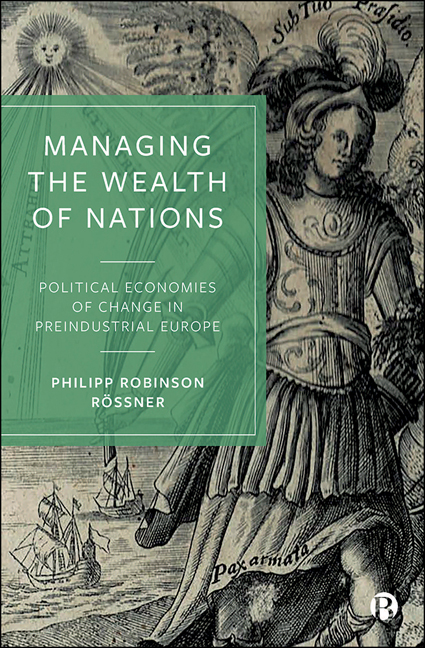Book contents
- Frontmatter
- Contents
- List of Figures and Tables
- Acknowledgements
- 1 Inventing Dynamics: Political Economies of Money, Markets and Manufacturing, 1300s–1800s
- 2 Governing the Future: Capitalism’s Early Modern Temporalities and the Origins of Growth
- 3 The Myth of the Myopic State: Governing Economy and the Politics of Economic Change, 1250s–1850s
- 4 Configuring Free Markets: A Deeper History of Laissez-Faire
- 5 Money and the Rise of Modern Capitalism
- 6 Velocity! Money, Circulation and Economic Development, c.1250–1850
- 7 Creating Wealth: Homo Manufacturabilis and the Wealth of Nations
- 8 Manufacturing Wealth: Industrial Policy and the Rise of the European Economy, 1350–1850s
- Epilogue: State Capacity and Capitalism from Cain to Keynes: Money, Markets and Manufacturing
- Notes
- Index
7 - Creating Wealth: Homo Manufacturabilis and the Wealth of Nations
Published online by Cambridge University Press: 17 January 2024
- Frontmatter
- Contents
- List of Figures and Tables
- Acknowledgements
- 1 Inventing Dynamics: Political Economies of Money, Markets and Manufacturing, 1300s–1800s
- 2 Governing the Future: Capitalism’s Early Modern Temporalities and the Origins of Growth
- 3 The Myth of the Myopic State: Governing Economy and the Politics of Economic Change, 1250s–1850s
- 4 Configuring Free Markets: A Deeper History of Laissez-Faire
- 5 Money and the Rise of Modern Capitalism
- 6 Velocity! Money, Circulation and Economic Development, c.1250–1850
- 7 Creating Wealth: Homo Manufacturabilis and the Wealth of Nations
- 8 Manufacturing Wealth: Industrial Policy and the Rise of the European Economy, 1350–1850s
- Epilogue: State Capacity and Capitalism from Cain to Keynes: Money, Markets and Manufacturing
- Notes
- Index
Summary
Manufacturing capitalism: between concepts, policies and ideas
Manufactures are of great use to the state. They create abundance, improve agrarian output, abolish poverty, purge the country of idlers and idleness, promote arts and sciences, bring comfort and ease to its inhabitants; fill the coffers of the fisc, and make us forget about the shortcomings and infertility of agriculture.
Julius Bernhard von Rohr, Einleitung zur Staats-Klugheit (1716), p 1019Our great origin myths often configure industry and the task of being industrious as part of a bigger Fall from Grace. Adam and Eve were expelled from Paradise because they had tasted the forbidden fruit. The consequence was an endless life of misery and toil (Genesis). When Cain, a farmer, slew his brother Abel – a herdsman (Genesis 4:1– 18), you would hardly guess he’d come away so lightly. Yes, human economy would in consequence be a life of endless toil: ‘If you till the soil, it will no longer give you strength. A restless wanderer shall you be on the earth’. But Cain got rehabilitated, and even became forefather of industrial modernity. Cain's name in literal translation simply means ‘metalsmith’. He founded a city and, by ways of his great-great-great-grandsons turns out to be the forefather of music, ironmaking and economic development:
Then Cain went out from the presence of the Lord and dwelt in the land of Nod on the east of Eden. And Cain knew his wife, and she conceived and bore Enoch. And he built a city, and called the name of the city after the name of his son – Enoch. To Enoch was born Irad; and Irad begot Mehujael, and Mehujael begot Methushael, and Methushael begot Lamech. Then Lamech took for himself two wives: the name of one was Adah, and the name of the second was Zillah. And Adah bore Jabal. He was the father of those who dwell in tents and have livestock. His brother's name was Jubal. He was the father of all those who play the harp and flute. And as for Zillah, she also bore Tubal-Cain, an instructor of every craftsman in bronze and iron. (Genesis 4:16– 22)
- Type
- Chapter
- Information
- Managing the Wealth of NationsPolitical Economies of Change in Preindustrial Europe, pp. 148 - 163Publisher: Bristol University PressPrint publication year: 2023



